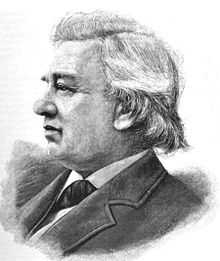McVicker's Theater
McVicker's Theater (1857–1984) was a playhouse in Chicago, Illinois, United States. Built for actor James Hubert McVicker, the theater was the leading stage for comedic plays in Chicago's early years. It often hosted performances by Edwin Booth, who married McVicker's daughter and was once targeted there in an attempted murder. Adler & Sullivan designed a remodel in 1883. Although destroyed in two fires, including the Great Chicago Fire, McVicker's remained an operating theater until 1984. It was demolished the next year
History

James Hubert McVicker was born in New York City, New York on February 14, 1822. His father James died shortly after his birth, so he was raised by his moth Nancy and two siblings. He attended some public school before apprenticing as a printer when he was ten. For the next five years, he operated machines in New York printing houses. In October 1837, he was hired as an apprentice for the Republican in St. Louis, Missouri, and was named a journeyman three years later. Howeverm he found little enjoyment in the trade and he decided to acquire a classic education.[1]
In 1843, he entered a production at the St. Charles Theater in New Orleans, Louisiana. McVicker traveled to various cities around the country to perform. In April 1848, he settled in Chicago, Illinois. The comedian who had worked at John Blake Rice's theater was just about to leave and Rice offered his position to McVicker. His first performance there was on May 2, 1848 in My Neighbor's Wife. His wife also performed, starring in Hue and Cry.[1] McVicker starred opposite Rice's wife in Lend Me Five Shillings on April 27, 1849.[2]
Two years after the death of Dan Marble, McVicker purchased the right to use his plays from the family estate. He went on a national tour and then toured England in 1855. The next year, McVicker became manager of the People's Theater in St. Louis. The playhouse was very successful and in March 1857 he used the proceeds to establish a new theater in Chicago. McVicker's Theater opened on November 5, 1857 featuring its own stock company performing the comedic plays Honeymoon and Rough Diamond.[2]
Edwin Booth starred in A New Way to Pay Old Debts on May 31, 1858. He would later perform Richelieu, Richard III, and Brutus there, and he married one of McVicker's daughters in 1869. The theater was remodeled in 1864. James Henry Hackett performed as Falstaff in 1865. It was again extensively remodeled in August 1871, but was destroyed in the Great Chicago Fire weeks later. However, it was rebuilt, and reopened on August 15, 1872. Mark Gray fired two bullets in an unsuccessful attempt to murder Edwin Booth on April 23, 1879 while the actor was performing Richard II.[2]
Actors who performed in McVicker's company over the years included James O'Neill and Robert B. Mantell. McVicker's was remodeled again in 1883 by Adler & Sullivan, but again destroyed in a fire in 1890. The rebuilt theater, designed by the same, opened on March 31, 1891 with a performance of The Rivals featuring Joseph Jefferson, William J. Florence, Louisa Lane Drew, and Viola Allen. McVicker died on March 7, 1896. His widow assumed management until she sold the theater to Jacob Litt on May 1, 1898.[2] The theater was demolished and rebuilt in 1922. Balaban & Katz purchased the building in 1926. It later showed films until it was shut down in 1984. It was demolished the next year.[3]
References
- ↑ 1.0 1.1 Flinn, John J., ed. (1893). The Hand-book of Chicago Biography. Chicago, IL: The Standard Guide Company. p. 255.
- ↑ 2.0 2.1 2.2 2.3 Freiserger, Edward (June 1911). "Theatre Beginnings in Chicago". The Theatre Magazine XIII (124): 198–200.
- ↑ Balaban, David (2006). The Chicago Movie Palaces of Balaban and Katz. Chicago, IL: Arcadia Publishing. pp. 63–64.
External links
McVicker's Theatre in Chicago 1891
- McVicker's Theatre
- McVicker's Theatre programme
- McVicker's Theatre auditorium
- Bas-reliefs by Johannes Gelert
- La Salle's Triumphant March Through Illinois
- The Fort Dearborn Massacre